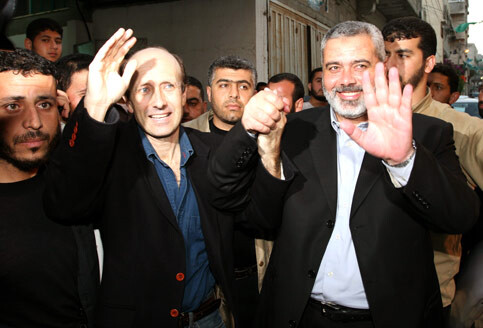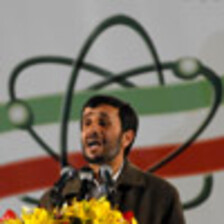The Electronic Intifada 5 July 2007

Freed BBC reporter Alan Johnston and the deposed Palestinian Prime Minister, Ismail Haniyeh, raise their hands following Johnston’s release in Gaza City early Wednesday, 4 July 2007. (Wissam Nassar/MaanImages)
JERUSALEM, 5 July (IPS) - It was the achievement Hamas had been waiting for ever since it vanquished the Fatah movement in Gaza and seized control of the coastal strip last month. Now, the Islamic movement is hoping that the release Wednesday of BBC reporter Alan Johnston, held captive in Gaza for almost four months, will convince the international community that it is a serious partner and is able to impose order on the chaos-ridden, lawless streets of the densely populated strip.
Hamas leaders in Gaza are trumpeting Johnston’s release as heralding a new era of law and order in the strip. Ismail Haniyeh, the Hamas Prime Minister dismissed by Palestinian President Mahmoud Abbas after the Gaza takeover, said the freeing of the BBC reporter “confirms (Hamas) is serious in imposing security and stability.”
Another senior Hamas official, Mahmoud Zahar, said the release was “a clear message. We will not allow illegal actions against anyone. We are going to confiscate weapons in the hands of clans used for personal interests.”
Johnston, who worked for the BBC for three years in Gaza, was snatched on March 12 and held by a clan-based group calling itself the Army of Islam, which once had close ties with Hamas before they went bad last year. The terms of the deal whereby the shady group released Johnston in the early hours of Wednesday morning, handing him over to Hamas, were not entirely clear.
But the move followed strong pressure by Hamas on the Doghmush clan, which snatched Johnston, as militants took up positions around the hideout where the Scottish-born reporter was being held. According to some reports, the clan, which at one point had demanded cash for the release of Johnston, was allowed to keep some of its weapons as part of the deal with Hamas.
Last month, as Johnston languished in captivity, civil war erupted in Gaza with Hamas routing Fatah forces in the strip. “There was something uniquely depressing … about being kidnapped and lying in your hideout when the forces of law and order are killing each other in a very intense way in the streets around instead of actually looking for you,” the BBC reporter said after his release.
But Johnston intimated that were it not for the Hamas takeover of Gaza, he would likely still be in captivity. After the Islamic movement seized Gaza, he said his captors suddenly became nervous, because Hamas has “a huge law and order agenda.”
“I’m pretty sure if Hamas hadn’t come in and stuck the heat on in a big way, I’d still be in that room,” he said.
A gaunt but smiling Johnston made his first comments in the office of Haniyeh, who draped a scarf with the Palestinian national colors around his neck. Later Wednesday the freed reporter spoke to journalists at a news conference held in the British consulate in Jerusalem. He said he had “dreamt many times of being free and always woke up back in that room. Now it really is over and it is indescribably good to be out.”
Johnston, who turned 45 in captivity, said that he spent most of his time with “a strange guy who barely spoke to me for days and would just glare at me and fly into rages at tiny things — a door slamming or whatever — and then at other times, once a fortnight, he would come across completely different and friendly, especially if he thought it might be coming to an end, the whole kidnapping.”
At one point the man invited him to watch television and he saw his father holding a press conference and calling for his release. The only time he endured any violence, he said, was as he was being driven by his captors to the handover point where he was to be released. He said they “slammed” his head during the drive.
But he said he was often unsure if he would survive the kidnapping ordeal. Hours after he was abducted, he recalled, the leader of the group appeared in the doorway of the room where he was being held, his face concealed by a red-and-white kefiyeh scarf, and told him he would not be harmed. A short while later, however, he was woken and his captors “put a hood over my head again and handcuffed me and took me out into the night, and of course you really wonder how that might end.”
“The last 16 weeks, of course, were just the very worst you can imagine of my life, like being buried alive, really, removed from the world,” he said.
His main source of comfort was a radio that picked up BBC broadcasts and enabled him to listen to programs calling for his release. He recalled hearing, for instance, how technicians at the rock festival in Glastonbury had laid down their tools in a show of solidarity with him. “I’m so immensely grateful for that, and I will be all my life,” he said, referring to the outpouring of solidarity.
While Hamas has tried to portray its role in bringing about Johnston’s release as a sign of its commitment to law and order, the rival and more moderate Fatah faction has accused the Islamic movement of being in league with the kidnappers and of staging the release in an effort to curry favour with the international community. Yasser Abed Rabbo, a senior aide to President Abbas, said the Army of Islam and Hamas were allies and had coordinated the kidnapping. “I think that this was staged by Hamas to appear as if it respects international law,” he said.
But Khaled Meshaal, the exiled Hamas leader who is based in Damascus, insisted that Johnston’s release was a stark contrast with the “anarchy” that prevailed in Gaza when Fatah was still present there.
After Hamas’ violent takeover of Gaza, Abbas dismissed the government headed by Haniyeh and appointed an emergency government, which operates in the West Bank. Hamas has refused to recognize the new government, creating a situation in which Gaza and the West Bank are now governed by two separate Palestinian bodies.
While Israel and the West have backed Abbas, Gaza remains isolated under Hamas, with internationally imposed sanctions still in place there. The embargo was imposed after Hamas came to power last year and refused to alter its policy of not recognizing Israel.
Now the Islamic movement is hoping that Johnston’s release will prove to the international community that it is a reliable partner and that it is serious about imposing law and order in Gaza. At the press conference with Johnston in his office, Haniyeh said he now wanted to end the captivity of Gilad Shalit, an Israeli soldier snatched by Palestinian militants from a base inside Israel a year ago and who is still being held captive in Gaza. Hamas has demanded the release of hundreds of prisoners in Israeli jails in exchange for Shalit.
“Gaza is safe, Gaza is clean, Gaza is green,” said Ahmed Yousuf, an aide to Haniyeh, in a reference to the green color that symbolizes Hamas.
Johnston, though, won’t be taking his chances again any time soon on the streets of Gaza. He said he had no immediate plans to return: “I spent three years covering Gaza as a correspondent and I spent four months in solitary confinement there, and I feel — enough already with Gaza. You know, maybe I’ll go back when it’s a member of the EU.”
All rights reserved, IPS - Inter Press Service (2007). Total or partial publication, retransmission or sale forbidden.
Related Links


